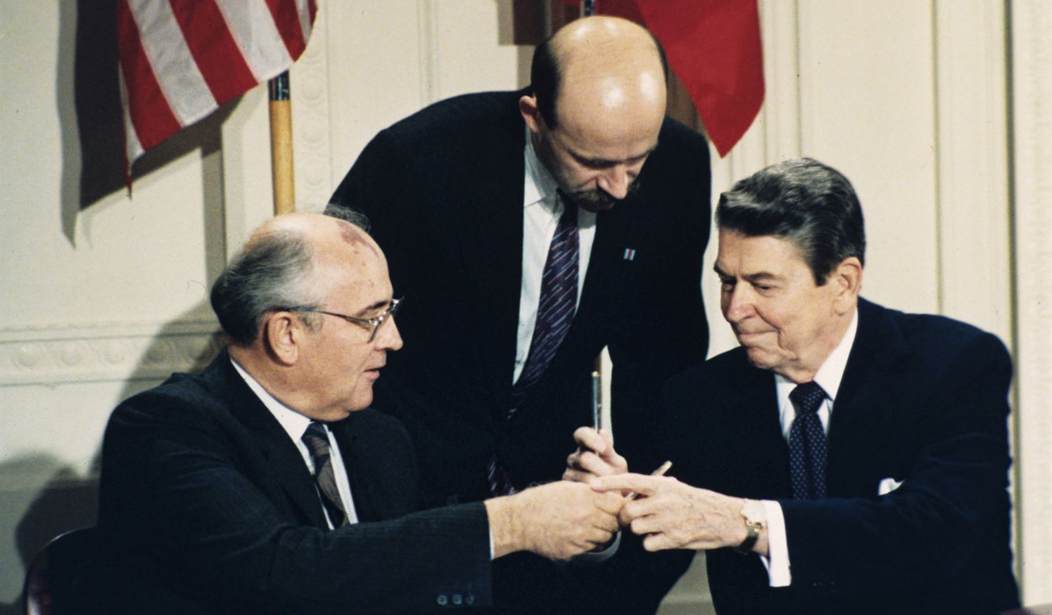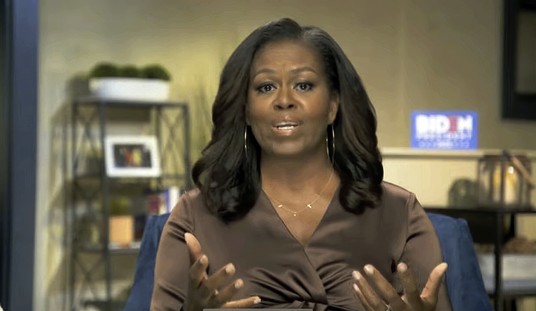In 1983, I was a 29-year-old office drone working for a trade association in Washington, D.C. I remember the year clearly because Washington was full of war talk. It was war hysteria, actually.
Then, as now, the left was talking itself into a crisis. Because Ronald Reagan was refusing to bend the knee to the Soviet Leader Yuri Andropov and continue the failed policy of detente, the left was beside itself with hysteria. There were "die-ins," and protests with signs that claimed "We Want To Live!" as if everyone else wanted to die.
We found out later that Andropov was so paranoid that a false warning in the Soviet Union of a U.S. missile launch almost destroyed the world. Only the courageous actions of a single Soviet officer, Stanislav Petrov, who refused to believe the warning, saved the world.
Petrov was on duty Sept. 26, 1983, when the early-warning satellite system he was monitoring detected what appeared to be five approaching U.S. nuclear-armed intercontinental ballistic missiles. Petrov was faced with a critical choice that had to be made immediately: treat the warning as a false alarm or alert his superiors, who likely would launch a counterattack. Petrov went with false alarm, later explaining he reasoned that if the United States really were to start a nuclear war, it would do so with more than five missiles.
Less than two months after that, 100 million people watched the ABC made-for-TV drama "The Day After." What was remarkable about the film is that it was almost completely devoid of politics. At the beginning of the movie, there were references in the background news broadcasts of a "crisis" but no details. The first inkling that anything was wrong was when the familiar civil defense warning blared on TV.
But it wasn't a test. And Kansas City was about to go through hell when two nuclear explosions blew the city up and the world was never the same.
If you haven't seen the film, it's a gripping look at why the Cold War made people so fearful. It was a time when every siren that sounded, every civil defense test, and sometimes a rumbling in the distance, would elicit feelings of dread.
"The Day After" brought all those feelings and visions of war to life. And it was damned uncomfortable.
The writer A. B. Stoddard remembers how her father, ABC’s motion-picture president Brandon Stoddard, came up with the idea for The Day After. “He wanted Americans, not politicians, to grapple with what nuclear war would mean, and he felt ‘fear had really paralyzed people.’ So the movie was meant to force the issue.”
And so it did, perhaps not always productively. Some of the immediate commentary bordered on panic. (In New York, I recall listening to the antinuclear activist Helen Caldicott on talk radio after the broadcast, and she said nuclear war was a mathematical certainty if Reagan was reelected.) Henry Kissinger, for his part, asked if we should make policy by “scaring ourselves to death.”
Reagan, according to the scholar Beth Fischer, was in “shock and disbelief” that the Soviets really thought he was headed for war, and in late 1983 “took the reins” and began to redirect policy.
Related: Columnist: The Media Is Not Hysterical Enough in Warning About a Trump Victory
The misunderstandings that almost led to war have been replaced by mistrust and hate from Russian President Vladimir Putin. The Russian president has never gotten over the Soviets's loss of empire and the United States becoming the preeminent power in the world to this day. We can point to a decline in American power in Asia relative to China over the last two decades, but no other nation comes close to our military power or economic clout.
It turns out, we didn't have to fight a nuclear war to defeat Russia. We drove their economy into the dust because Soviet leaders couldn't have both guns and butter in their command economy. And when Reagan announced the development of a missile defense system, Gorbachev knew the game was over. Russia could never hope to match the U.S. in technology or military spending.
Eventually, the Kremlin hardliners rebelled and tried to end Gorbachev's experiment in "Communism With a Human Face." It not only didn't work, it led to the swift ending of the Russian empire.
It sticks in the left's throat that the United States won the Cold War just as Reagan said we would. It wasn't "detente" or any other left-wing fever dream that did it. It was American strength and resolve that won through to victory.










